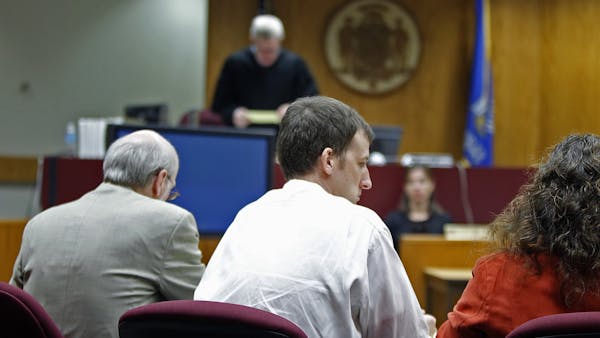HUDSON, Wis. – Aaron Schaffhausen couldn't explain what triggered him to choke his youngest daughter and end up killing all three of his girls, he told a mental health expert, according to testimony Monday in Schaffhausen's insanity trial.
Schaffhausen said he went to visit his three daughters in their River Falls home, went upstairs to look at their toys after talking to the baby sitter, gave them money to put in their piggy banks and talked with them about going to a park, according to the psychiatrist's testimony.
But when he was helping 5-year-old Cecilia look for her lost shoes, "the next thing he knew he had her neck in his hands and he was strangling her," Dr. Ralph Baker testified that Schaffhausen said.
Baker concluded after a 3½-hour interview in February with Schaffhausen that the defendant was not legally insane at the time of the crimes.
Schaffhausen pleaded guilty to the July killings of his daughters, 11-year-old Amara, 8-year-old Sophie and Cecilia. His defense attorneys are trying to prove that he suffered from a mental disease or defect and should be sent to a mental institution instead of prison.
Schaffhausen was cooperative and friendly during the interview, Baker said, but at one point slowed his voice when talking about the day of the crimes and said tearfully it was "a spur of the moment thing," Baker testified. Baker's testimony offered jurors a glimpse of Schaffhausen's recounting of the crime.
Baker testified that Schaffhausen described the scenario with some details:
He thought Cecilia was dead after the strangling. Amara and Sophie came in from outside and he heard Cecilia crying. He got a knife from the kitchen and slit all three girls' throats.
Afterward, he was "shocked and very upset to find so much blood around, on them and on the floor," Baker said. "He began to try to clean everything up."
Schaffhausen was going to put his T-shirts over the girls like pajamas, but doing that proved too difficult so he tied the shirts around their necks, tucked them each into their beds and kissed them on their foreheads "not goodbye, but good night," Baker noted.
Schaffhausen spilled gasoline onto a piece of cardboard to set the house on fire, but decided against lighting it, he told Baker, according to testimony. He threw his cellphone and laptop in dumpsters, drove around and eventually called his ex-wife to tell her what he had done, and cried.
Baker said Schaffhausen had a memory of what occurred during the crime, but "whether he had the memory of every detail, I don't know."
Baker, a court-appointed expert, said Schaffhausen had a major depressive disorder, but found no evidence he had a major mental illness or "abnormal condition of the mind."
One expert each for the defense and the prosecution are still expected to testify.
Monday's testimony, launching the second week of the trial, came under increased security at the St. Croix County courthouse after a witness in the case was arrested Friday.
Joseph A. Rollag, 31, of Andover, allegedly told a deputy that "bad things would happen" unless he spoke immediately to Schaffhausen's lawyer.
According to a criminal complaint, Rollag allegedly called a psychiatric evaluating nurse from a pickup truck, telling her he was having "thoughts of harming or killing the prosecutors" and other witnesses testifying against Schaffhausen. The nurse called the county dispatch center, which alerted deputies at the courthouse. They escorted Rollag into a conference room, where they found two knives on him. A third knife was located in his pickup, which he purchased from Schaffhausen.
Rollag appeared in court Monday afternoon to face one felony count of threatening witnesses. He was also charged with three misdemeanors.
Earlier Monday, Schaffhausen's parents and aunt each testified, describing him as a child with a rough start: a colicky baby, an unaffectionate and impulsive child, a teen who got into trouble with the law.
Schaffhausen's mother, Sue Allen, a principal at a Catholic elementary school, said her son suffered mental illness "probably his whole childhood."
Schaffhausen didn't connect well with adults, including his father, and didn't have many friends, she said. He was diagnosed with attention deficit disorder and hyperactive disorder in third grade. As a teenager, Schaffhausen spent time in juvenile detention for burglary and shoplifting and was expelled from school, his parents testified.
The family members also described Schaffhausen maturing into a good father. Roger Schaffhausen took photos of Aaron sledding and swimming with the girls, eating ice cream and cutting birthday cakes.
"He adored the girls and they loved him," his mother said.
But they saw a change in him before the killings. Both parents received middle-of-the-night phone calls from him while he was working in North Dakota. His mother called a family meeting and his brothers went to check up on him.
Schaffhausen's aunt, Patricia Fix, said after hearing about his thoughts of harming his kids from her daughter, she called Schaffhausen's mother right away, telling her: "You need to get up to North Dakota and have Aaron committed because he's going to go to Wisconsin and slit the girls' throats."
Staff writer Curt Brown contributed to this story.
Pam Louwagie • 612-673-7102

Souhan: This is KAT's chance to prove Flip Saunders was right

